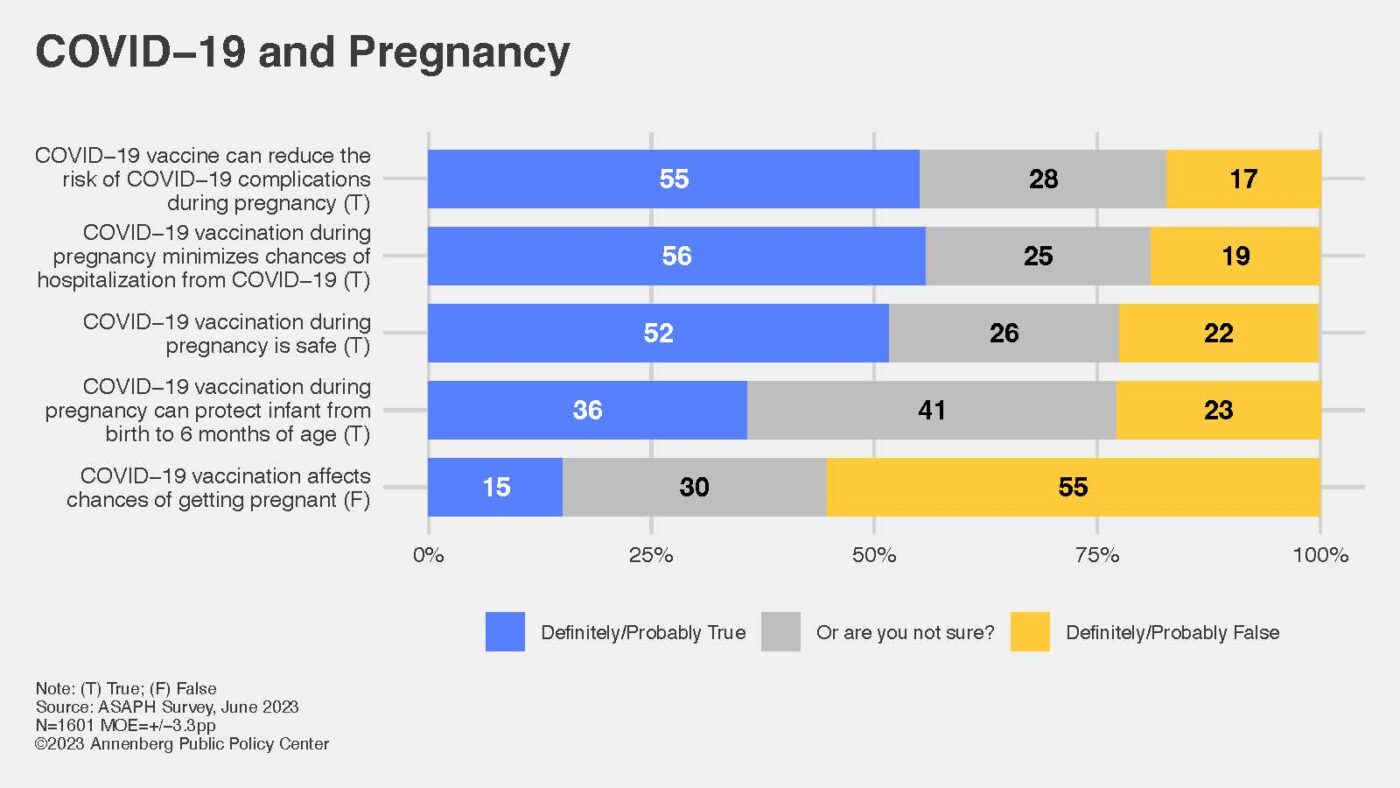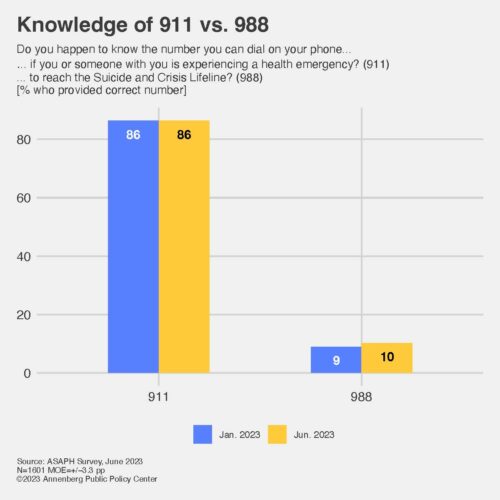Most people know it isn’t safe to smoke or drink alcohol while pregnant, and most know that how well a pregnant person takes care of their health affects the health of their baby. But do they know what vaccines are recommended for pregnant people by the U.S. Centers for Disease Control and Prevention (CDC)?
While much of the public is familiar with some information about staying healthy during pregnancy and having a healthy baby, there are substantial gaps in knowledge about maternal health, according to new survey data from the Annenberg Public Policy Center (APPC) of the University of Pennsylvania. The findings come amid a maternal health crisis in the United States, which has the highest maternal mortality rate of any developed nation, more than double the rate of peer countries, according to the U.S. Department of Health and Human Services.
In addition, the survey, conducted nearly a year after the federal government introduced the new 988 Suicide and Crisis Lifeline, finds that just 10% of the public knows the number.
“The Suicide Lifeline’s ability to save lives presupposes that those in need know the 988 number,” said APPC Director Kathleen Hall Jamieson, who directs the survey. “We need to redouble our efforts to add 988 to the numbers everyone has at hand.”
The survey, conducted with a nationally representative panel of 1,601 U.S. adults from May 31-June 6, 2023, finds that:
- Just over 1 in 4 people (27%) know that the CDC recommends that pregnant individuals get a Tdap vaccine against whooping cough.
- Just over half of those surveyed know that getting vaccinated against Covid-19 during pregnancy is safe (52%) and that getting vaccinated against Covid-19 can reduce the risk of complications from the disease (55%) that can affect a pregnancy.
- Only a quarter of those surveyed (26%) know that a pregnant person who gets the flu is at higher risk of delivering the baby early.
- Nearly 3 in 4 people (73%) know that having untreated high blood pressure increases the likelihood that a pregnant person will have a stroke.
Annenberg Science and Public Health Knowledge survey
The maternal health survey data come from the 11th wave of a nationally representative panel of 1,601 U.S. adults, first empaneled in April 2021, conducted for the Annenberg Public Policy Center by SSRS, an independent market research company. This wave of the Annenberg Science and Public Health Knowledge (ASAPH) survey was fielded May 31-June 6, 2023. It has a margin of sampling error (MOE) of ± 3.3 percentage points at the 95% confidence level. Survey data on public knowledge about RSV, respiratory syncytial virus, was previously released. See the topline for question wording.
Download the topline and the methodology.
Vaccinations and pregnancy
Asked which vaccinations the CDC recommends individuals get during pregnancy, majorities know that the CDC does not recommend a chickenpox or measles vaccine, which are live virus vaccines:
- 87% know that the CDC does not recommend the chickenpox vaccine
- 85% know that the CDC does not recommend a measles shot
- But 73% incorrectly said the CDC does not recommend a vaccine for whooping cough known as Tdap during pregnancy – in fact, the CDC does recommend the whooping cough vaccine during pregnancy, as 27% know.
Both the Tdap vaccine against whooping cough and the flu shot are inactivated vaccines and are recommended by the CDC during each pregnancy. During pregnancy, the CDC recommends the flu shot, not the live attenuated vaccine known as LAIV or nasal spray.
Natural immunity: Two-thirds of those in the maternal health survey (67%) know it is false to say that because babies are born with natural immunity, they don’t need to be vaccinated against childhood illnesses until they are likely to be exposed to them. But one-third of those surveyed think either that this is true (17%) or are not sure (16%).
The flu and pregnancy
In a series of true-or-false questions:
- Only 1 in 4 people (26%) know that a pregnant person who gets the flu is at higher risk of delivering the baby early. About the same number (27%) think that is false. Nearly half of those surveyed (46%) are not sure.
- Only half of those surveyed (52%) know it is true that a flu shot protects pregnant people and their babies from serious health problems both during and after pregnancy.
Covid-19 and pregnancy
The CDC says that pregnant people “are more likely to get severely ill with Covid-19 compared with non-pregnant people.” The CDC says pregnant people “can receive a Covid-19 vaccine” and that getting the vaccine during pregnancy can prevent an individual from getting severely ill from Covid-19. The survey found that:
- Over half (55%) know it is false to claim that Covid-19 vaccination affects a couple’s chances of getting pregnant, but 15% incorrectly think it is true and 30% are not sure.
- Only 1 in 5 people (22%) know it is true that Covid-19 vaccines can cause “a small, temporary increase in the length of a vaccinated person’s menstrual cycle,” while 17% incorrectly say it is false and most people (61%) are unsure.
- Just over half of those surveyed (52%) know that Covid-19 vaccination during pregnancy is safe, while 22% incorrectly think it is false and 26% are not sure.
- Just over half (55%) know that getting a Covid-19 vaccine can reduce the risk of Covid-19 complications that can affect a pregnancy, while 17% incorrectly say this is false and 28% are not sure.
- Just over half (56%) know that Covid-19 vaccination during pregnancy is effective at minimizing the chances of hospitalization with Covid-19, while 25% are not sure and 19% say it is false.
- Over 1 in 3 people know (36%) that getting a Covid-19 vaccine during pregnancy can protect an infant from birth to six months of age from Covid-related hospital stays. But 23% think this is false and 41% are not sure.

Other maternal health risks
Many of those surveyed are aware of certain health risks:
- 73% know that untreated high blood pressure increases the likelihood that someone who is pregnant will have a stroke, though 21% say they are not sure and 6% incorrectly think it is false.
- 78% know that pregnant people should be tested for diabetes, though 16% are not sure and 6% incorrectly think it is false. According to the CDC, from 1 in 50 to 1 in 20 pregnant women has gestational diabetes, which sometimes does not go away after delivery or can return as type 2 diabetes.
- 90% know that how well a person takes care of their health before getting pregnant affects the health of their baby.
- 92% know that how well a person takes care of their health during their pregnancy affects the health of their baby.
Smoking and drinking alcohol
After years of warnings about the dangers of smoking, many in the public are knowledgeable about the potential harms during pregnancy
- 72% know that smoking during pregnancy increases the chances that the baby will be born early, though 18% are not sure and 10% think this is false.
- 83% know that smoking during pregnancy increases the chances that the baby will have birth defects, though 9% are not sure and 8% think this is false.
- 85% know it is false to say that drinking wine or beer while pregnant is safe though 8% say this is true and 6% are not sure.
Smoking and SIDS: Fewer people are aware of the connection between smoking and sudden infant death syndrome, or SIDS. Just over half (52%) know that smoking in the home of a baby increases the chances that the baby will die from sudden infant death syndrome, while 30% are not sure and 18% say this is false.
Smoking and birth weight: Asked what effect smoking during pregnancy would likely have on a baby’s weight at birth, most (76%) said it increases the chances that the smoker’s baby will be underweight at birth, compared with those who think it increases the chances the baby will be overweight (2%) or have no effect on the baby’s weight (2%). Twenty percent were not sure.
Drinking and pregnancy: Asked which statement is most accurate, 65% know that someone who wants to get pregnant should stop drinking alcohol before pregnancy and not drink during pregnancy – compared with 25% who say someone who wants to get pregnant should stop drinking as soon as they learn they are pregnant, 4% who say someone who wants to get pregnant should limit their alcohol intake while pregnant to two drinks a day, and 6% who are not sure. The CDC says someone who is trying to get pregnant might already be pregnant, so “the best advice is for women to stop drinking alcohol when they start trying to get pregnant.”
Pregnancy health care
The survey asked about maternal health during pregnancy and about breastfeeding:
Folic acid: Most of those surveyed know that pregnant people should take vitamins containing folic acid: 76% know that individuals who are or may become pregnant should take a daily vitamin that contains folic acid, which is a B vitamin, though 21% are not sure and 3% say it is false. The CDC recommends this for people who are pregnant.
Pregnancy weight gain: Asked which is the most accurate statement about weight gain for a person of “normal weight” during pregnancy, 45% correctly say a gain of between 25 and 35 pounds; 24% say a gain of between 5 and 10 pounds; 26% are not sure; and 5% say “try not to gain weight during pregnancy.” The CDC says 25 to 35 pounds is the recommended weight gain for a person of normal weight.
Benefits from breastfeeding: 71% know it’s most accurate to say that breastfeeding benefits both the breastfed baby and parent, as opposed to 17% who say it benefits the baby, 1% who say it’s the parent and 1% neither. The CDC says breastfeeding benefits both baby and parent.
Putting a newborn to sleep
How to put a baby down to sleep: 61% correctly say a new baby should be put down to sleep on its back, 12% say on its side, 12% say on its stomach, and 15% are not sure. The CDC recommends putting a baby to sleep on its back.
Avoid soft bedding: The CDC recommends keeping “soft bedding such as blankets, pillows, bumper pads, and soft toys out of their baby’s sleep area…” but many of those surveyed are not aware of this. Asked which of the following should be kept out of a baby’s sleep area:
- 72% say that pillows should be kept out of a baby’s sleep area
- 69% say soft toys
- 54% say soft bedding such as blankets
- 43% say bumper pads
Mental health: The 988 suicide lifeline
The Annenberg survey also sought to determine whether the public had become familiar with the new three-digit Suicide and Crisis Lifeline, 988, introduced in July 2022. Nearly a year after its introduction, however, the survey found that only 20% of those surveyed said they knew the number – and when asked to provide it, just over half that group could do so, or 10% of the total.
This finding is not statistically different from January 2023, four and a half months earlier, when 9% could provide the number – suggesting that there has been little progress in familiarizing the public with a vitally important suicide-prevention resource.
By contrast, 86% of the public knows to dial the number 911 when someone is experiencing a health emergency.

The topline with data from this wave of the survey is available here.

